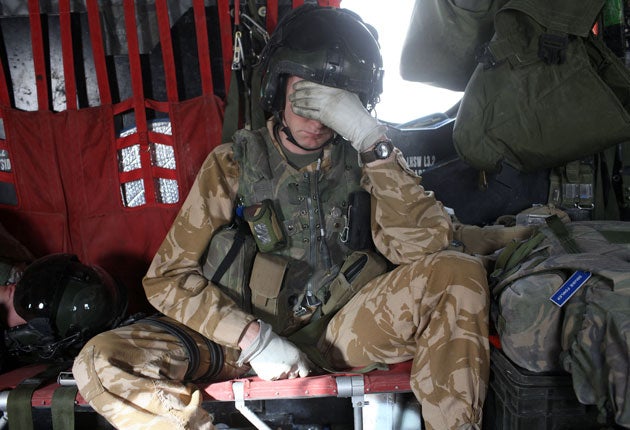MPs get their first chance to vote on Afghan withdrawal
Commons to have its say as ex-Army chief Dannatt condemns Blair and Brown over defence spending

The Defence Secretary, Liam Fox, will this week face calls to set out a detailed timetable for the withdrawal of British troops from Afghanistan in the first major Commons vote since the war began almost nine years ago.
New powers handed to backbenchers will allow MPs to debate the continued deployment of British forces, with many of the record new intake expected to express unease at the timescale for troops coming home.
In a sign of the shifting focus in the war-torn country, the Afghan president, Hamid Karzai, yesterday announced he had formed a council to pursue peace talks with the Taliban. Many in Westminster now accept the only hope of a settlement is through negotiating with insurgents, not by pursuing ongoing military action.
To date, 332 British military personnel have died in Afghanistan since 2001, while 1,500 have been wounded in action. Last night Mr Fox ordered an urgent review into reports in The Sunday Times that 5,000 wounded war heroes classed as medically unfit would be forced out of the forces to cut costs. He wanted to "ensure that those who have fought and sacrificed for their country are treated in a proper and honourable fashion".
The Commons vote comes amid claims the Blair-Brown rivalry at the heart of the Labour government caused "impossible operational pressures" for the armed forces in both Iraq and Afghanistan. The former head of the Army, General Sir Richard Dannatt, uses a new book, Leading from the Front, serialised in The Sunday Telegraph, to claim Gordon Brown was a "malign" influence by failing to fund military commitments agreed by his government. Tony Blair lacked the "moral courage" to overrule his Chancellor.
The coalition has empahsised that British forces will not remain in Afghanistan indefinitely. David Cameron expects the Afghan forces to take control of security by 2014 with a deadline for the withdrawal of British combat troops set for the following year. The Deputy Prime Minister, Nick Clegg, last week staged a surprise visit to Camp Bastion, and claimed the military campaign was "turning the corner" – though he admitted he had "no idea exactly how and when we will succeed".
However, a new YouGov poll shows that 30 per cent of the public think British troops should be brought home "immediately" while a further 42 per cent said "soon". Just 7 per cent thought the UK was "winning the war with the Taliban". The Independent on Sunday understands that a growing number of MPs from across the political spectrum have doubts about the claim that the presence of British troops in Afghanistan makes Britain's streets safer.
Paul Flynn, a Labour MP and long-standing opponent of the conflict, said: "At the moment Parliament is not doing its job. The majority of the public would like to see the troops home before Christmas, and Parliament is not reflecting that. The Government and all the main politicians are in denial on this. They are divorced from reality.
"Nick Clegg said we have turned a corner in Afghanistan. We have turned so many corners we have been around the block many times – and we are still in hell."
Both the Netherlands and Canada announced withdrawal plans after a shift in public mood at home. While the Ministry of Defence understands the political reasons to set out a plan to withdraw by 2015 at the latest, senior figures are "unhappy" at the amount of detail given.
"I don't think we can discount the possibility of an exit earlier than 2015," one minister said. "If the Americans decided to come out earlier, we are not going to be there on our own."
In 2001, 13 Labour rebels made clear their protest against the conflict in a vote on a technicality in the House of Commons. However, Thursday's debate is being seen as the first time MPs have been able to vote on a substantive motion, which reads: "That this House supports the continued deployment of UK armed forces in Afghanistan."
Peter Bone, a Tory MP and member of the Backbench Business Committee, whose son has served in the RAF in Afghanistan, said: "We want the Commons, for the first time, to say whether it wants to continue in Afghanistan or not. On Iraq we had a proper vote and debate on it." Longer-serving MPs are still angry with John Reid, who, as Labour's defence secretary, said in 2006, as troops moved into the south: "We would be perfectly happy to leave in three years' time without firing one shot."
Tim Farron, a Liberal Democrat MP and co-chair of the party's foreign policy group, said: "I want them out sooner rather than later, but also we need to look at how we achieve our security in Afghanistan." Talks with the Taliban were needed, he added. "The crucial thing now is accepting that some of the people running at least part of Afghanistan might be a bit ugly."
Join our commenting forum
Join thought-provoking conversations, follow other Independent readers and see their replies
Comments
Bookmark popover
Removed from bookmarks